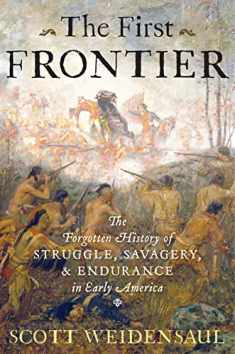
Braddock's Defeat: The Battle of the Monongahela and the Road to Revolution (Pivotal Moments in American History)
ISBN-13:
9780199845323
ISBN-10:
0199845328
Edition:
First Edition
Author:
David L. Preston
Publication date:
2015
Publisher:
Oxford University Press
Format:
Hardcover
482 pages
FREE US shipping
Book details
ISBN-13:
9780199845323
ISBN-10:
0199845328
Edition:
First Edition
Author:
David L. Preston
Publication date:
2015
Publisher:
Oxford University Press
Format:
Hardcover
482 pages
Summary
Braddock's Defeat: The Battle of the Monongahela and the Road to Revolution (Pivotal Moments in American History) (ISBN-13: 9780199845323 and ISBN-10: 0199845328), written by authors
David L. Preston, was published by Oxford University Press in 2015.
With an overall rating of 3.6 stars, it's a notable title among other
Native American
(Americas History, Colonial Period, United States History, Revolution & Founding, State & Local, France, European History, Great Britain, Military History, World History) books. You can easily purchase or rent Braddock's Defeat: The Battle of the Monongahela and the Road to Revolution (Pivotal Moments in American History) (Hardcover, Used) from BooksRun,
along with many other new and used
Native American
books
and textbooks.
And, if you're looking to sell your copy, our current buyback offer is $0.29.
Description
Braddock's Defeat by David Preston is a "classic work by one of the most gifted young historians working today," according to series editor David Hackett Fischer.
Finalist, 2016 George Washington Book Prize
Winner, 2015 Guggenheim-Lehrman Prize in Military History
Winner, 2016 Distinguished Book Award in U.S. History, Society for Military History
Winner, 2016 PROSE Award for U.S. History Category, Association of American PublishersWinner, 2016 Distinguished Book Award, Society for Colonial WarsWinner, 2016 Judge Robert Woltz History Award, French & Indian War Foundation
On July 9, 1755, British regulars and American colonial troops under the command of General Edward Braddock, commander in chief of the British Army in North America, were attacked by French and Native American forces shortly after crossing the Monongahela River and while making their way to besiege Fort Duquesne in the Ohio Valley, a few miles from what is now Pittsburgh. The long line of red-coated troops struggled to maintain cohesion and discipline as Indian warriors quickly outflanked them and used the dense cover of the woods to masterful and lethal effect. Within hours, a powerful British army was routed, its commander mortally wounded, and two-thirds of its forces casualties in one the worst disasters in military history.
David Preston's gripping and immersive account of Braddock's Defeat, also known as the Battle of the Monongahela, is the most authoritative ever written. Using untapped sources and collections, Preston offers a reinterpretation of Braddock's Expedition in 1754 and 1755, one that does full justice to its remarkable achievements. Braddock had rapidly advanced his army to the cusp of victory, overcoming uncooperative colonial governments and seemingly insurmountable logistical challenges, while managing to carve a road through the formidable Appalachian Mountains. That road would play a major role in America's expansion westward in the years ahead and stand as one of the expedition's most significant legacies.
The causes of Braddock's Defeat are debated to this day. Preston's work challenges the stale portrait of an arrogant European officer who refused to adapt to military and political conditions in the New World and the first to show fully how the French and Indian coalition achieved victory through effective diplomacy, tactics, and leadership. New documents reveal that the French Canadian commander, a seasoned veteran named Captain Beaujeu, planned the attack on the British column with great skill, and that his Native allies were more disciplined than the British regulars on the field.
Braddock's Defeat establishes beyond question its profoundly pivotal nature for Indian, French Canadian, and British peoples in the eighteenth century. The disaster altered the balance of power in America, and escalated the fighting into a global conflict known as the Seven Years' War. Those who were there, including George Washington, Thomas Gage, Horatio Gates, Charles Lee, and Daniel Morgan, never forgot its lessons, and brought them to bear when they fought again-whether as enemies or allies-two decades hence. The campaign had awakened many British Americans to their provincial status in the empire, spawning ideas of American identity and anticipating the social and political divisions that would erupt in the American Revolution.
Finalist, 2016 George Washington Book Prize
Winner, 2015 Guggenheim-Lehrman Prize in Military History
Winner, 2016 Distinguished Book Award in U.S. History, Society for Military History
Winner, 2016 PROSE Award for U.S. History Category, Association of American PublishersWinner, 2016 Distinguished Book Award, Society for Colonial WarsWinner, 2016 Judge Robert Woltz History Award, French & Indian War Foundation
On July 9, 1755, British regulars and American colonial troops under the command of General Edward Braddock, commander in chief of the British Army in North America, were attacked by French and Native American forces shortly after crossing the Monongahela River and while making their way to besiege Fort Duquesne in the Ohio Valley, a few miles from what is now Pittsburgh. The long line of red-coated troops struggled to maintain cohesion and discipline as Indian warriors quickly outflanked them and used the dense cover of the woods to masterful and lethal effect. Within hours, a powerful British army was routed, its commander mortally wounded, and two-thirds of its forces casualties in one the worst disasters in military history.
David Preston's gripping and immersive account of Braddock's Defeat, also known as the Battle of the Monongahela, is the most authoritative ever written. Using untapped sources and collections, Preston offers a reinterpretation of Braddock's Expedition in 1754 and 1755, one that does full justice to its remarkable achievements. Braddock had rapidly advanced his army to the cusp of victory, overcoming uncooperative colonial governments and seemingly insurmountable logistical challenges, while managing to carve a road through the formidable Appalachian Mountains. That road would play a major role in America's expansion westward in the years ahead and stand as one of the expedition's most significant legacies.
The causes of Braddock's Defeat are debated to this day. Preston's work challenges the stale portrait of an arrogant European officer who refused to adapt to military and political conditions in the New World and the first to show fully how the French and Indian coalition achieved victory through effective diplomacy, tactics, and leadership. New documents reveal that the French Canadian commander, a seasoned veteran named Captain Beaujeu, planned the attack on the British column with great skill, and that his Native allies were more disciplined than the British regulars on the field.
Braddock's Defeat establishes beyond question its profoundly pivotal nature for Indian, French Canadian, and British peoples in the eighteenth century. The disaster altered the balance of power in America, and escalated the fighting into a global conflict known as the Seven Years' War. Those who were there, including George Washington, Thomas Gage, Horatio Gates, Charles Lee, and Daniel Morgan, never forgot its lessons, and brought them to bear when they fought again-whether as enemies or allies-two decades hence. The campaign had awakened many British Americans to their provincial status in the empire, spawning ideas of American identity and anticipating the social and political divisions that would erupt in the American Revolution.


We would LOVE it if you could help us and other readers by reviewing the book
Book review

Congratulations! We have received your book review.
{user}
{createdAt}
by {truncated_author}




